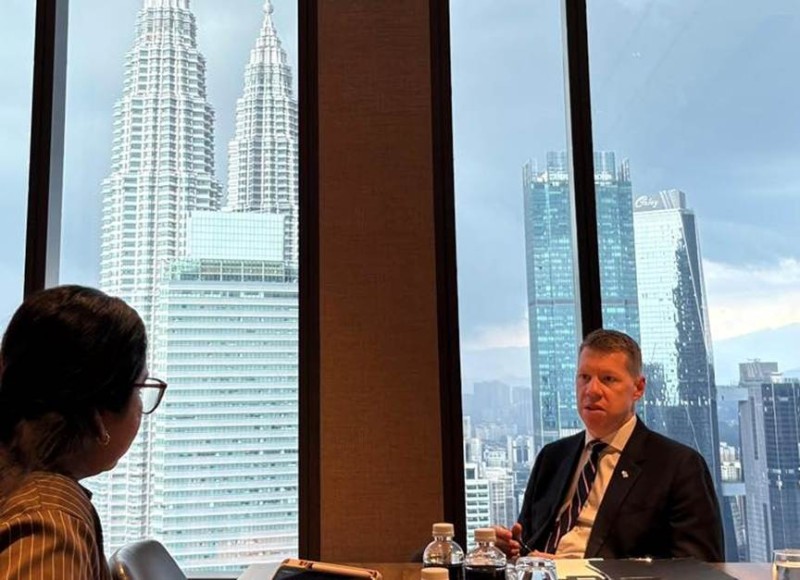
Image credit: Facebook
KUALA LUMPUR: South Australia is deepening its trade and investment engagement with Malaysia, a country it sees as both a vital export market and a strategic gateway to Asean.
Joe Szakacs MP, South Australian Minister for Trade and Investment, told Business Times during his official visit to Kuala Lumpur recently that the state is focused on strengthening economic ties.
"Malaysia is a critically important economic partner for South Australia and our third-largest export destination. What I see is a significant opportunity for collaboration in advancing the economic interests of both jurisdictions," he said.
Copper remains the largest export from South Australia to Malaysia and continues to underpin the bilateral trade relationship. More than A$1 billion worth of copper was shipped to Malaysia over the past year, driven by higher commodity prices and rising production.
"Copper is the mineral required to decarbonise the world. Without copper, we do not get electrification, and without electrification, we simply cannot decarbonise," he said.
Food exports also play a key role, including grains, wheat, beef, lamb, and wine. Premium South Australian wines, representing over 80 per cent of Australia's premium wine production, have seen exports to Malaysia rise 16 per cent over the past year.
Szakacs credited strong partnerships with Malaysian distributors and retailers such as Jaya Grocer, as well as Malaysia Airlines' direct air link, enabling "ultra-fresh" delivery of premium products in under 24 hours.
Energy transition opens new areas for collaboration
South Australia's experience in renewable energy transition is another area of cooperation with Malaysia. By 2027, the state expects to become the first jurisdiction in the world where 100 per cent of net energy generation comes from renewables.
"We have invested in decarbonisation and the green transition for generations, and that is paying dividends," Szakacs said.
He stressed that the journey has not been linear and involved overcoming challenges.
"What we can share with jurisdictions like Malaysia is what we have done, what we would do differently, and how we've benefited from investment in decarbonisation to grow local jobs," he said.
He identified strong collaboration potential in hydrogen, sustainable fuels, green steel, ammonia, battery minerals and clean energy technologies, sectors that require what he calls "green electrons".
As Malaysia accelerates its own energy transition, Szakacs believes South Australia can contribute through experience and innovation.
Meanwhile, he said that food safety, halal assurance and traceability remain central to bilateral engagement, particularly as South Australian producers scale compliance to Malaysian standards.
Szakacs cited Thomas Foods International – South Australia's largest beef producer – for its halal certification, animal welfare practices and traceability systems, which he said boost consumer and regulatory confidence.
He emphasised that compliance enables a consistent supply of high-quality products suited to Malaysian households, supermarkets, restaurants and hospitality sectors.
"Fresh produce can go from a farm in South Australia to the dinner plate of a consumer in Kuala Lumpur in less than 24 hours. That's where the premium offering can continue to grow," he said.
Advanced manufacturing and innovation partnerships
Szakacs described advanced manufacturing as "the beating heart" of South Australia's economy, spanning sectors from medical technology and vehicle production to the development of nuclear-powered submarines.
He said existing partnerships with Malaysian universities, industry players and the Adelaide–Penang sister-city relationship will support supply chain resilience and shared workforce development.
He believes supply chain resilience will unlock deeper cooperation, allowing innovations developed in South Australia to be manufactured in Malaysia – and vice versa.
Szakacs added that this kind of collaboration not only strengthens economic ties but also creates high-value jobs and opportunities for workforce development in both jurisdictions.
Malaysia as a regional hub for Asean market access
Szakacs sees Malaysia as a natural hub for Asean market access, supported by strong logistics infrastructure and growing air connectivity. In a world shaped by tariffs and geopolitical tensions, he stressed the value of working with trusted partners.
"We unequivocally know that the imposition of tariffs is not a good thing – not for local jobs and not for consumers. Australia is a trusted partner of Malaysia, and Malaysia is a trusted partner of Australia," he said.
He also welcomed Malaysia's role within Asean, noting its contribution to regional economic development.
"In the very near future, Asean will be the fourth-largest economy in the world, and that can only be achieved through coordination and collaboration," he added.
Szakacs encouraged Malaysian companies to consider investing in South Australia, noting the state's stable regulatory framework, business-friendly environment and robust government backing.
"We are an accessible jurisdiction. As Malaysian businesses consider investing in South Australia, they can do so with confidence, knowing they have a government that values their partnership and stands ready to support them," he said.
Source: https://www.nst.com.my/business/economy/2025/11/1321588/south-australia-targets-closer-economic-partnership-malaysia

